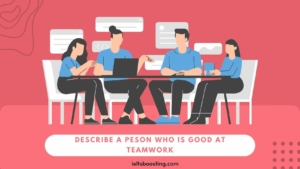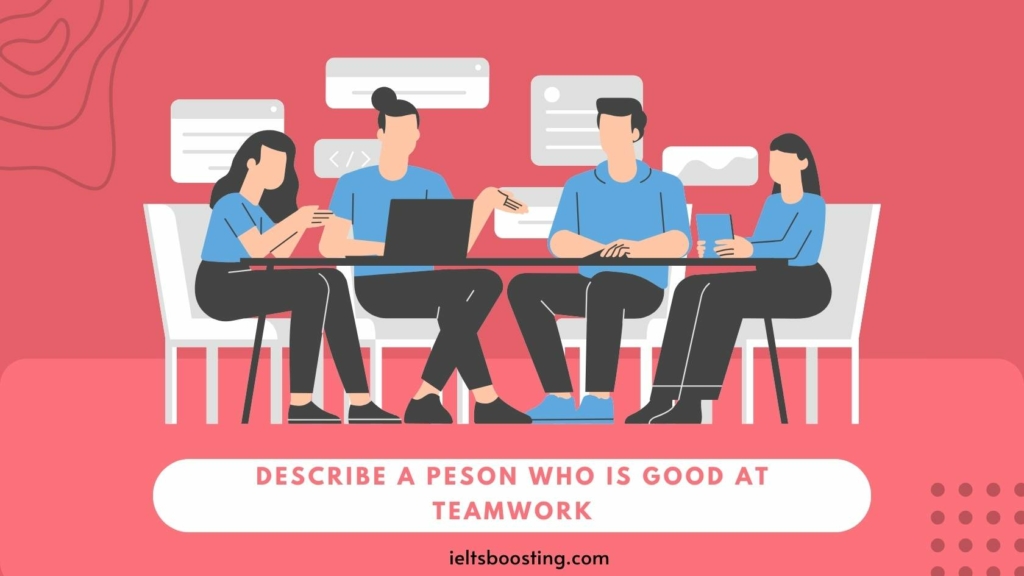Describe a peson who is good at teamwork
You should say:
What team he/she joined
What work he/she did
What his/her role was
And explain what makes him/her a good member of that team
Rounding-off questions:
What do other people in the team think about him/her?
Sample answer
I’d like to talk about (……) I know who’s really awesome at teamwork. She’s part of our marketing team and works as a content writer. Her main gig is to churn out all sorts of written stuff, like blog posts, ad copies, you name it. What makes her stand out as a team player, though, is how she’s always in sync with everyone else on the team. Like, she’s super good at collaborating. Whenever there’s a project, she’s right there, brainstorming with the team, bouncing ideas back and forth. It’s not just about doing her own bit; she’s always looking at the big picture, making sure her writing fits in perfectly with what everyone else is doing.
But what really sets her apart is how she’s with the newbies. You know, the freshers who are still finding their feet. She’s always there to lend a hand, giving them tips, guiding them through their first projects. It’s not just about being helpful; she’s got this way of making them feel included, part of the team. That’s so important, right? I think that’s what makes her such a great team player. It’s not just her writing skills, but how she works with everyone, helps bring out the best in the whole team.
Useful vocab
- Teamwork: Collaborative effort of a group to achieve a common goal.
- Marketing Team: A group of professionals working on promoting and selling products or services.
- Content Writer: A person responsible for creating written material like blog posts, articles, and ad copies.
- Churn Out: To produce something in large quantities and at a fast pace.
- Blog Posts: Articles or entries posted on a blog.
- Ad Copies: Written material for advertising purposes.
- Stand Out: To be noticeably different or better.
- Collaborating: Working jointly on an activity or project.
- Brainstorming: Producing ideas or ways of solving problems by holding a spontaneous group discussion.
- Bouncing Ideas Back and Forth: Exchanging ideas in a dynamic manner.
- The Big Picture: The overall perspective or objective.
- Newbies/Freshers: Individuals who are new to a job or activity.
- Lend a Hand: To help or assist.
- Inclusive: Including all; not excluding any part or individual.
Explore more:
Describe a foreigner you know who speaks Vietnamese well
Describe a person who has interesting ideas

Describe a peson who is good at teamwork
Part 3
What do you think are the characteristics of a good leader?
Well, I think a good leader has a mix of several important qualities. Firstly, they need to have strong communication skills. It’s not just about giving orders, but also listening to others and effectively conveying ideas. Another key characteristic is empathy. A good leader should be able to understand and share the feelings of their team. This helps in creating a supportive work environment. Then, there’s decisiveness. Being able to make tough decisions, sometimes under pressure, is crucial. Also, a good leader should inspire others. They should have the ability to motivate and encourage their team to achieve their best.
What happens if you don’t have a good leader?
Ver 1:Alright, so if there’s a bad leader in charge, things can get pretty messy. First off, everyone might end up feeling like they’re just wandering around without a clue. You know, when there’s no clear plan or someone to steer the ship, people get mixed up about what they’re supposed to do. This definitely hits productivity — it’s like everyone’s busy but not really getting anything done. Worst case, if things keep going south, it’s not just the team that suffers — the whole company could get a bad rep, especially if big projects tank or clients start walking away. So, bottom line, having a good leader? Super important
Ver 2:
Well, not having a good leader can really impact a team or organization negatively. For starters, it often leads to a lack of direction. Without clear goals and guidance, team members can feel lost or confused about their roles. This can result in decreased productivity, as people aren’t sure what they should be focusing on. Plus, poor leadership might lead to high turnover rates, with people leaving because they’re not satisfied or feel undervalued.
Why do some people not like teamwork?
You know, teamwork isn’t everyone’s cup of tea. Some folks prefer flying solo because they feel they can get things done faster or better on their own. It’s like, when you’re in a team, you have to wait for others to catch up or agree on things, which can be a bit frustrating for someone who’s used to calling the shots. And let’s not forget personality clashes. Sometimes, you just don’t gel with everyone in the team, and that can make working together a bit of a challenge.
- Teamwork: Collaborative effort of a group to achieve a common goal.
- Personality Clashes: Conflicts between people because of different characters.
- Gel: Form a good relationship or work well together.
- Downsides: The negative aspects of a situation.
Do you think young people are suitable for teamwork?
Absolutely, I think young people are often really well-suited for teamwork. They tend to be more open to new ideas and collaboration, you know? Like, they’re usually up for brainstorming sessions and bouncing ideas off each other, which is great for team dynamics. Of course, it depends on the individual, but generally, their energy and willingness to experiment can bring a lot of creativity and fresh perspectives to a team.
- Well-suited: Appropriately matched or qualified.
- Collaboration: Working jointly on an activity or project.
- Brainstorming: Producing an idea or way of solving a problem by holding a spontaneous group discussion.
- Bouncing Ideas Off: Sharing ideas with others to get feedback.
- Team Dynamics: The behavioral relationships between members of a group.
- Fresh Perspectives: New and unique viewpoints or ideas.


